Yaakov (Kuba) Wasilewicz
- son of Halina Wasilewicz z"l
“Because You are Jewish” – the Story of a Young Man’s Journey from Poland to the Five Towns
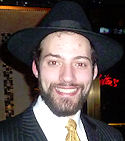 I was born in Częstochowa, Poland, in 1988. Since there were no Jewish schools in Poland at that time, my mother sent me to public school. When I was 8 years old I came back home from school and I told my mother what the teacher told us that day – “Mom, tomorrow we can’t eat meat, we are going to church and the priest is going to pour ashes over our heads.” My mother looked at me and said, “Sure, if you don’t want to eat meat tomorrow, I will not give you meat to eat, but you will not go to church.” I asked, “Why not? She said, “Because you are Jewish.”
I was born in Częstochowa, Poland, in 1988. Since there were no Jewish schools in Poland at that time, my mother sent me to public school. When I was 8 years old I came back home from school and I told my mother what the teacher told us that day – “Mom, tomorrow we can’t eat meat, we are going to church and the priest is going to pour ashes over our heads.” My mother looked at me and said, “Sure, if you don’t want to eat meat tomorrow, I will not give you meat to eat, but you will not go to church.” I asked, “Why not? She said, “Because you are Jewish.”
This is when I found out for the first time that I was Jewish. Since that day, I knew that I was Jewish but I didnt understand what it meant to be a Jew. All my friends from school would go to church and I was the only one who didn’t. When I was asked which church I belonged to, I would have to lie and make up a name. I once told my best friend in school that I was Jewish and the next day I was called by everybody a “dirty Jew”. That taught me to keep my mouth shut and not to tell anyone my secret.
For many years, my parents and I would attend a summer and winter Jewish camp in Poland called The Lauder Camp. This camp was a place where all the Jewish families from the whole Poland would come and spend a few weeks learning about Judaism. The camp was for all three generations of Polish Jews: Holocaust survivors, their children and grandchildren. Once I knew I was Jewish, it was refreshing to be in a place where I didnt have to hide my true identity the secret of who I was. There, everyone was Jewish and everyone felt comfortable. There, for the first time, I learned my favorite song, Modeh Ani, and I would sing it everywhere I went. I would even sing it in my school.
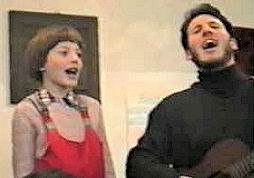
Above: R’Yonah Bookstein and I sing Modeh Ani at the Lauder Camp in Rychwald, Poland
Right: My mother, me and an older Jewish woman lighting Channukah candles at my mother’s Jewish Centre.
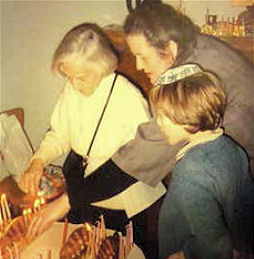
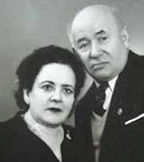 Aside from camp, I had another source for my Jewish education – my mother. My mother was the child of two Holocaust survivors – Braindl (nee Cwajghaftig) and Yankiel Wasilewicz (pic left). It was very hard to keep anything Jewish after the war, but they ried and they did. My mother’s mother lit the Shabbos candles, and my mother’s father made Pesach sedarim. My grandmother would take my mother, as a little girl, for the Rosh Hashana and Yom Kippur prayers to the “Congregation”, an old building in Częstochowa that housed the mikvah before the War. My grandfather used to do kapparos at home with my grandmother and my mother and would then bring the chickens to the shochet. Whatever they did after the War, even though it was hard for them, that’s what my mother knew, and that’s what she taught me.
Aside from camp, I had another source for my Jewish education – my mother. My mother was the child of two Holocaust survivors – Braindl (nee Cwajghaftig) and Yankiel Wasilewicz (pic left). It was very hard to keep anything Jewish after the war, but they ried and they did. My mother’s mother lit the Shabbos candles, and my mother’s father made Pesach sedarim. My grandmother would take my mother, as a little girl, for the Rosh Hashana and Yom Kippur prayers to the “Congregation”, an old building in Częstochowa that housed the mikvah before the War. My grandfather used to do kapparos at home with my grandmother and my mother and would then bring the chickens to the shochet. Whatever they did after the War, even though it was hard for them, that’s what my mother knew, and that’s what she taught me.
Since 1974, my mother has been working for the Social and Cultural Society of Jews in Częstochowa. Throughout the years, she worked hard to teach those Jews who were left in Częstochowa about the Jewish holidays. She organised events, inviting actors from the Jewish theatre in Warsaw to come to Częstochowa, hosting famous artists, writers, musicians, etc.. At this Jewish Centre I learned a lot about Judaism, but still it was not enough for me. I wanted to learn more.
When I was 12 years old, my mother started to think that it would be nice if I would have a bar mitzvah. She called Rabbi Michael Schudrich, who is Chief Rabbi of Poland today, but who back then was the Chief Rabbi of Warsaw and Lodz, and she asked him if he could teach me and prepare me for my bar mitzvah. He then asked my mother, “But does he have a bris?” My mother honestly said, “No”.
When I was born, there was no mohel in Poland, so I couldn’t have a bris when I was 8 days old. Therefore, I was never circumcised. The rabbi told my mother that I need to have a bris and that he wold try to arrange everything. A few days later, we got a phone call that the mohel (Rabbi Fisher, from Monsey, NY) will come to Poland just for me, so that I can have a bris, and that we should come to Warsaw where my bris would take place. So that’s what we did.
It took us three hours by train to get to Warsaw. After we got to the Jewish quarter and entered the Nozyk Synagogue, the main synagogue in Warsaw, we were informed by Rabbi Schudrich that, unfortunately, Rabbi Fisher was unable to come because something went wrong with his flight. We turned around and went back to Częstochowa. A few days later, we got another phone call from Rabbi Schudrich. He assured us that, this time, Rabbi Fisher would be able to come and that we should come once again to Warsaw. So we did. When we got to the Jewish quarter in Warsaw, we entered the Jewish theatre which is not far from the synagogue. We ate something there, and there we met my mother’s friend.
She asked us what we were doing in Warsaw so my mother told her the truth. She right away took me aside and tried to convince me not to do it. She said that it’s like cutting off my arm. After she was done, I thanked her but I told her that I was a Jewish boy and, if a Jewish boy has to have a bris, I’m having it!
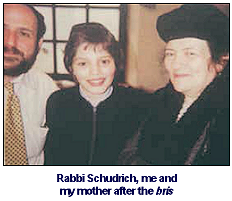 We went to the synagogue. There, we met with Rabbi Schudrich and Rabbi Fisher. That day was a day after the yahrtzeit of the famous Rabbi Elimelech of Lizensk, Poland. Thousands of Chassidim were coming back from Lizensk and going to the airport in Warsaw. Before going to the airport, some of the Chassidim decided to visit the synagogue. They came in and they saw that something was going on there, and one of the Chassidim became my sandek. His name was Rabbi Yaakov Yossef Neushloss. Afterwards, we were dancing in a circle and my sandek asked me for my address and my phone number. I gave him my address and my phone number and then my mother and I went back to Częstochowa.
We went to the synagogue. There, we met with Rabbi Schudrich and Rabbi Fisher. That day was a day after the yahrtzeit of the famous Rabbi Elimelech of Lizensk, Poland. Thousands of Chassidim were coming back from Lizensk and going to the airport in Warsaw. Before going to the airport, some of the Chassidim decided to visit the synagogue. They came in and they saw that something was going on there, and one of the Chassidim became my sandek. His name was Rabbi Yaakov Yossef Neushloss. Afterwards, we were dancing in a circle and my sandek asked me for my address and my phone number. I gave him my address and my phone number and then my mother and I went back to Częstochowa.
A few months later, I had a bar mitzvah in a yeshiva in Kishinow, Moldova, where for the first time I learned the Hebrew alphabet, just to be able to read the blessing before and after the reading of the Torah. The rabbis at that yeshiva found out that I love music, so they offered me that if I stay in the yeshiva, they will get me a private music teacher. But my mother would have to go back to Poland. I was only 13 years old and I didn’t want to stay by myself in a foreign country, so I went back to Poland with my mother.
Now I had a bris and a bar mitzvah – but I was still in a public school.
After the summer, we were invited by the Jewish Community of Warsaw to come to Warsaw for Rosh Hashana and Yom Kippur. We came and we were staying in a hotel there. After the holidays, I asked Rabbi Schudrich if he could help me come to Warsaw so that I could learn in the Lauder Jewish School there. I told him that, in Częstochowa, there was not much of a Jewish life. “Im in a public school, there is no synagogue in Częstochowa – and in Warsaw there is.” He told me that he will see what he can do.
A few months later, we got a phone call that Rabbi Schudrich had found us a place to stay and that we could come to Warsaw if we wanted to. We chose to go. At that time, I was 14 and I was in a middle of 8th grade. We moved to Warsaw for a year and a half.
In the Lauder school, I learned Jewish history, Jewish culture, and Hebrew language, but not Torah. After school, I had a private teacher who taught me how to put on tefillin and he got me a pair of tzitzis. I started to remind myself how to read Hebrew and started to pray, but only on Shabbos. I started to keep Shabbos and kosher as much as I could.
Sometime during that year, I got a phone call from my sandek, Rabbi Neushloss, that he was in Poland and he would like me to join him for a tour and for the yahrtzeit of Rav Elimelech of Lizensk. He sent a private driver who came to Warsaw, picked me up and brought me to where a bus full of Chassidim was waiting for me. We went from one cemetery to the next, from one shul to the next. Eventually, after a whole day of driving, we got to our final destination Lizensk. There, I spent the most amazing Shabbos of my life. The streets of Lizensk were filled with Chassidim.
This was the second time in my life seeing Chassidim. The first one was at my bris. It felt like I was in a different world. At the Shabbos night meal, thousands of Chassidim were eating together, singing together and, afterwards, dancing together. When everyone was dancing, the whole floor was shaking! It was an unbelievable experience. Sunday was the yahrtzeit and everyone, including me, was praying at the grave of the holy Rabbi Elimelech.
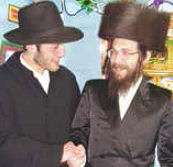 After the yahrtzeit, when we got back to Warsaw, Rabbi Neushloss (pic left: standing with me) asked me if I would want to come to his house for Pesach. I answered, “Sure”, but in my mind I was thinking about how I would be able to pay for the ticket. But I thanked him for everything and said goodbye. Some time before Pesach, I got a phone call from Rabbi Schudrich that Rabbi Neushloss sent him a ticket for me to come to his house in Monsey, NY. So I went. I spent a really beautiful Pesach there and, afterwards, I decided to visit a rabbi whom I knew from the Lauder Camp in Poland, Rabbi Lieber, who would travel to the camp from America to teach Polish Jews at the camp about Judaism. I told the rabbi that I was in the Lauder Jewish School but I didn’t know where to go after my graduation, since there were no Jewish high schools or yeshivas in Poland. He told me that he would try to look for something for me.
After the yahrtzeit, when we got back to Warsaw, Rabbi Neushloss (pic left: standing with me) asked me if I would want to come to his house for Pesach. I answered, “Sure”, but in my mind I was thinking about how I would be able to pay for the ticket. But I thanked him for everything and said goodbye. Some time before Pesach, I got a phone call from Rabbi Schudrich that Rabbi Neushloss sent him a ticket for me to come to his house in Monsey, NY. So I went. I spent a really beautiful Pesach there and, afterwards, I decided to visit a rabbi whom I knew from the Lauder Camp in Poland, Rabbi Lieber, who would travel to the camp from America to teach Polish Jews at the camp about Judaism. I told the rabbi that I was in the Lauder Jewish School but I didn’t know where to go after my graduation, since there were no Jewish high schools or yeshivas in Poland. He told me that he would try to look for something for me.
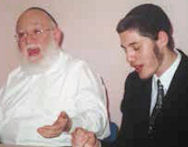 In my last year in the Lauder School, right before the summer, I didn’t know what to do. All my friends were applying to different high schools and I was waiting for a phone call from Rabbi Lieber (pic right: singing with me). Finally, a month before summer, I got a phone call that I could come to a yeshiva in America. I got a visa and left Poland at the age of 15. I started learning in the Bobov Yeshiva in Boro Park. I learned there maybe for a month before switching to the Talmudical Academy of Baltimore.
In my last year in the Lauder School, right before the summer, I didn’t know what to do. All my friends were applying to different high schools and I was waiting for a phone call from Rabbi Lieber (pic right: singing with me). Finally, a month before summer, I got a phone call that I could come to a yeshiva in America. I got a visa and left Poland at the age of 15. I started learning in the Bobov Yeshiva in Boro Park. I learned there maybe for a month before switching to the Talmudical Academy of Baltimore.
Since I didn’t know much about Yiddishkeit and I never really studied Torah before, I was placed in a second grade where, for the first time in my life, I learned Chumash. I remember when, for the first time, I said a pasuk from the Chumash, all the kids in the class were clapping. That same year, I went to the 4th grade and there, for the first time, I learned mishnayos. Next year, I went to the sixth and the eighth grades where, for the first time, I learned gemara. A year later, I went to the tenth grade and a year after that I went to the twelfth grade and graduated high school in 2008.
After graduating from the Talmudical Academy of Baltimore, I went to Yeshiva Shor Yoshuv in Lawrence, NY, where I am today. Aside from making lifelong friends and learning a lot of Torah in Shor Yoshuv, ironically, I was told that the song Modeh Ani, which was and still is my favorite song, was composed by a rebbi who taught in Shor Yoshuv for many years – Rabbi Shmuel Brazil!
Living as a Jew in Poland was not easy. It was like living in darkness. I tried to put all the puzzles together, but I was missing a lot of the pieces. Today, thanks to many great people and of course to Hashem, our G-d, I fully understand what it means to be Jewish.
I am forever grateful to my mother for letting me leave Poland to study in a yeshiva, even though I’m her only child, and to all the people that made my dream come true. The first words I utter every morning are for me as they are for all religious Jews a constant reminder that our lives are a journey guided by the hand of Hashem and that He brilliantly enlightens our path and guides us along the way – Modeh ani lifanecha.
Yaakov Wasilewicz
Yaakov is the son of Halina Wasilewicz z”l, former long-serving Chairperson of the Częstochowa branch of the TSKŻ – the Social and Cultural Association of Jews in Poland.
This article originally appeared in The Jewish Home on 8th May 2014 and is reproduced on this website with Yaakov’s kind permission.
Yaakov welcomes your questions and comments.
He can be reached at:
jakub.wasilewicz@gmail.com
Webmaster’s Comment:
I first met Yaakov when he was a young boy in Warsaw back in 1998 and, over the years, having met him fairly regularly, both at our Reunions and on other occasions in Warsaw, Częstochowa and New York, I’m proud to call him my friend.
His story is one that I hope will inspire other young Polish Jews to learn more about, and embrace, their Jewish heritage.
